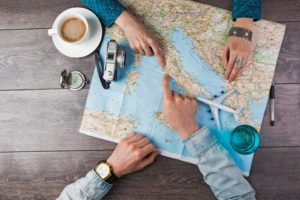As a kid, traveling was never priority for my family. While we did travel, it was viewed more as a leisure activity to get away from our ‘normal’ lives than traveling for the sake of traveling. It was way into adulthood that I started looking at travel as something that not only let me get away from the routine, but, more importantly, broadened my horizons, reshaped my sense of the world and taught me the importance of perspectives. And to my luck, I found a partner who was equally (or more, to be honest!) enthusiastic about traveling and who viewed traveling as a form of learning.
As much as adulthood can be daunting, we barely have a choice when it comes to these things (or maybe we do, but I guess that’s just not me) and as with other wedded couples, my partner and I began pooling our resources and planning our investments. Given our love for traveling, it was no surprise that one of our main buckets of investment was the travel fund. Note that I use the word “investment”. And here’s where you may disagree with me. To many, travel is an expenditure and when viewed as an expense, may not sound necessary or very appealing. But to us, travel is a necessary investment – an investment in ourselves, as the travel blogger Matthew Karsten says.
Travel enriches you and opens your eyes to history, places, cultures, practices, people, ideas and beliefs that you never knew existed. Like the “Jólabókaflóð”, or “Christmas Book Flood,” that takes place every Christmas Eve in Iceland when Icelanders gift each other books and then spend the night reading the book. Or the tradition of slurping your ramen as a sign of appreciation in Japan. At times, travel forces you to confront views that you would otherwise be uncomfortable with. As Cesare Pavese puts it, “traveling is a brutality. It forces you to trust strangers and to lose sight of all that familiar comfort of home and friends. You are constantly off balance.” Whatever be the experience, travelling leaves you changed (for the better mostly), however small or unnoticeable the change may seem. And that is why I feel it is an investment which deserves to be nurtured and given the same amount of importance as your retirement fund or your property fund.
Like any other investment, traveling requires smart investing. Budgeting right, preparing in advance, and having a clear plan of what you would like to do at your destination goes a long way in saving valuable money. Here are some tips from my experiences traveling in Asia, Europe and North America.
Embrace the kind of traveler you are
Are you a luxury traveler or look for the best budget deals? Do you travel for leisure or adventure? Would you make do with street food and cooking your own meals on travel? Having an idea of what kind of travel is your cup of tea goes a long way in drawing down a budget, and more importantly, sticking to it. If you know what your budget per night for a hotel room is, for instance, that would help you estimate how much you would be willing to spend on accommodation for the entire trip. In this regard, starting from the nitty-gritties and adding them up to a rather accurate budget makes more sense than conjuring up a very rough overall number without having done much research on what the costs of travel in the destination are and trying to fit all your expenditure into this range.
Book in advance
Flight tickets are at the cheapest 3-4 months before travel in the case of international trips, and 2 months in advance for domestic travel. You often get the best prices if you book midweek. Set alerts on sites like Google Flights, FareCompare and Scott’s Cheap Flights. Tap into your credit card, many cards have tie-ups with airlines to provide discount to customers. Some cards even let you use the airport lounge for free. Use Hotels.com, Booking.com or Airbnb to book accommodation. They provide a variety of accommodation choices, ranging from 5-star hotels to shared dorm rooms. Similarly, try to book tourist attraction tickets online. Most famous tourist attractions have a special online price that may be cheaper than prices at the gates, and often have only a fraction of the wait time. I booked tickets to the Eiffel Tower online, turned up at the chosen time and went to the top in ten minutes. People waiting to purchase tickets at the gates had a two hour wait in the lines.
Use public transport
Indian travellers may find this uncomfortable and taxing owing to difficulties we face with public transport in the country, but most western and east Asian countries have impeccable public transit with great connectivity. In Tokyo and New York City, I could find a metro station within a five minute walk from any part of the city. They have special 1-day, 2-day or 3-day passes for tourists at a discounted price, enabling intra-city transport at a fraction of the cost of, say, hiring a cab.
Purchase travel insurance
This sounds like a no-brainer but is often overlooked by most people. Travel insurance comes at a negligible cost in relation to your overall travel budget, but covers very important variables like your health and baggage in times of duress.
Pack smart
Always check what is allowed to be brought into the destination before packing. Many countries are strict about perishable food items, seeds and leaves. Pack as light as possible, as this allows you to move freely at your destination. If your hotel/accommodation has laundry facilities, consider carrying fewer clothes than the number of days you travel. Carry your medication and a doctor’s prescription if the medicines are not over-the-counter. Pack your chargers, converter pins and power banks in order to not waste time and money buying one in the destination (Pro tip: Most hotels have a treasure trove of converter pins and chargers left behind by previous travellers, ask the reception to provide you one if you forgot to carry your own).
Finally, I recognise that I am fortunate to be in a position that allows me to afford a travel fund. But I do believe that traveling is a constant goal that one should work towards, and should be something you invest for steadily, however small the investment may be and however long it may take to build enough for the trip you want to take. So where are you traveling next?




Couldn’t agree more..